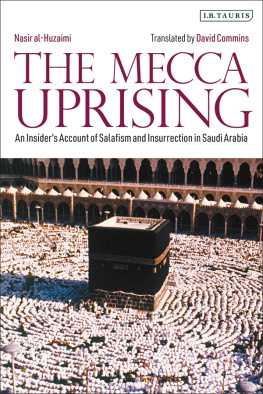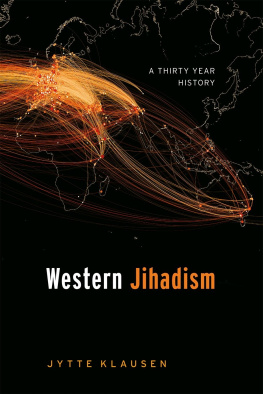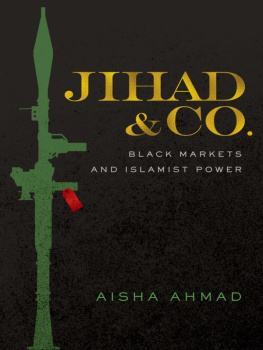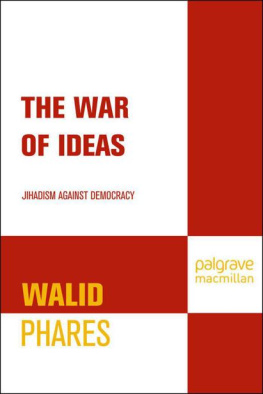PENGUIN BOOKS
SALAFI-JIHADISM
Shiraz Maher is a lecturer in the Department of War Studies at Kings College London. He is Deputy Director of its International Centre for the Study of Radicalisation (ICSR), and is an adjunct at Johns Hopkins University in the United States. Maher is also a contributing writer for the New Statesman, frequently writing on jihadist groups, the Syrian crisis, and the broader Middle East.
Shiraz Maher
SALAFI-JIHADISM
The History of an Idea
PENGUIN BOOKS
UK | USA | Canada | Ireland | Australia
India | New Zealand | South Africa
Penguin Books is part of the Penguin Random House group of companies whose addresses can be found at global.penguinrandomhouse.com.
First published in Great Britain by C. Hurst & Co. (Publishers) Ltd. 2016
Published in Penguin Books 2017
Text copyright Shiraz Maher, 2016
The moral right of the author has been asserted
Cover photograph Reuters/Bassam Khabieh
Cover design: Antonio Colao
ISBN: 978-0-141-98627-2
for Maryam
Acknowledgements
The study of Salafism as an idea, movement and religious doctrine in the English speaking world was done a great service by the edited collection of essays put together by Roel Meijer in Global Salafism. Over the last five years this work has inspired a cluster of academic and scholarly works exploring the idea even further. Important texts on some of modern Salafisms intellectual forbears such as Ibn Taymiyya and Abd al-Wahhab have since emerged but, as Meijer himself notes, there remains a lack of studies specifically focusing on Salafi-Jihadi thought. This is curious given the not unsubstantial body of primary source material that is in circulation from leading theorists of the movement.
For a moment it seemed as if militant Salafism might have been in decline with the United States killing both Osama bin Laden and Anwar al-Awlaki. At the same time ostensibly peaceful uprisings gathered momentum across North Africa, particularly in Tunisia and Egypt. Bashar al-Assad changed all that, with his brutal repression galvanising global support for militant millenarian movements.
My research into the contours of Salafi thought began in late 2010, several months before the Syrian crisis began. Throughout this time I have been based in the Department of War Studies at Kings College London, where I am a Senior Fellow at the International Centre for the Study of Radicalisation (ICSR). My sincerest thanks must first go to the Chairman, Henry Sweetbaum, and the trustees: Sir David Sieff, Jonathan Sacher CBE, the Rt. Hon. Kim Campbell and H.E. Omar Saif Ghobash for the tremendous opportunity they have extended me. Kings College London has also supported me immensely. For this, I must thank Sir Lawrence Freedman, Theo Farrell, Joe Maiolo and Michael Rainsborough, who have consistently offered invaluable advice.
This book is essentially my PhD thesis and I am therefore extremely grateful to my supervisor, mentor and friend, Peter Neumann, who oversaw the whole thing. He waited with varying degrees of patience and frustration as I kept telling him just one more chapter to go, then its done, when, in truth, there were probably three or four left to write at the time. He has helped me refine many of my ideas, reorganised lots of the material presented here, and ultimately trusted me to conduct my own research. He has also been my boss at ICSR throughout this time, which has been a fantastic base from which to work on issues relating to militant Salafism. I am grateful to him for all of it.
I have been lucky enough to work with many friends during this time, particularly John Bew, Alexander Meleagrou-Hitchens and Martyn Frampton. On my day-to-day activities I was supported by the best team of Syria analysts anywhere in the world, colleagues who enlightened the study of an otherwise dour subject matter. I am indebted to Joseph Carter, Melanie Smith (Millie), Audrey Alexander and Nick Kaderbhaithe dream team. I must also thank my other ICSR colleagues Aaron Zelin, Scott Kleinmann, Christina Mitsiali and Katie Rothman. Antoine Barthe provided accommodation and generous hospitality when I collected research materials in the United States.
I have benefitted from numerous exchanges over the years with distinguished and brilliant scholars whose opinions, insights and generosity have helped shape my views. I thank Gilles Kepel, William McCants, Thomas Hegghammer, Joas Wagemakers, Brynjar Lia, Lorenzo Vidino, Mark Stout, Gary Ackerman, Magnus Ranstorp and Sayed Khatab. For their detailed and considered comments on this manuscript, I am grateful to David Martin Jones and Edwin Bakker. The two anonymous peer-reviewers who checked my work prior to publication provided me a great service with their forensic feedback. They saved me from a number of embarrassing howlers, for which I thank them. Mitchell Reiss also gave me an opportunity to work on this project while I was a visiting lecturer at Washington College. I thank him and the students for a most enjoyable experience.
Special mention must be given to Thom Dyke, one of my oldest friends, who agreed to be my guinea pig. As an intelligent non-specialist I hoped he would be able to follow and enjoy the content of this book. He generously sacrificed several weekends to meticulously check the manuscript, commenting on style, language and structure. I am hugely grateful to him. Samar Batrawi slapped my wrists when I made basic errors with Arabic texts and was always ready to answer rudimentary questions on Arabic grammar and prose (and much else besides)a walking, talking version of Hans Wehr. Dave L-Squad McAvoy was also extremely helpful in this regard, always insightful, always funny. Aymenn Jawad Ali al-Tamimi is a polyglot and never refuses an opportunity to discuss all things jihad. Thank you.
For their friendship and support while I wrote this book I would also like to thank Marcus and Lucy Appleton, Pete and Alex Johnson, Dan and Joey Segelman, Ben and Kate Scott, Alex Glenister, John Kenyon, Dominic Chastney, David Toube, Duncan Gardham and Laura Kramer.
My publisher, Michael Dwyer, has been a pleasure to work with throughout this process as have his team at Hurst. My agent, Rachel Conway, expertly walked me through the process of getting the first book out and only sent me harassing emails when absolutely necessary.
Much of the research in this book was funded by a generous grant from the Gerda Henkel Stiftung. Im very grateful to them for backing my research.
My greatest debt is to my family: my parents, Ehsan and Rubina; my sister, Madiha; and Ayisha. They have sacrificed and endured much to get me where I am today, and I hope this book goes some way towards repaying that debt. Finally, this book is dedicated to my wonderful, brilliant daughter, Maryam.
Note on Transliteration
I have transliterated Arabic terms in this book using the conventions of the International Journal of Middle East Studies (IJMES) with diacritic markings. There are, however, some exceptions to this. IJMES rules state that words found in MerriamWebsters should be spelled as they appear there and not treated as technical terms. They should have no diacritics, nor should they be italicised. This applies to terms such as jihad, mujahideen and shaykh (and many others). There are some exceptions to this which preserve















